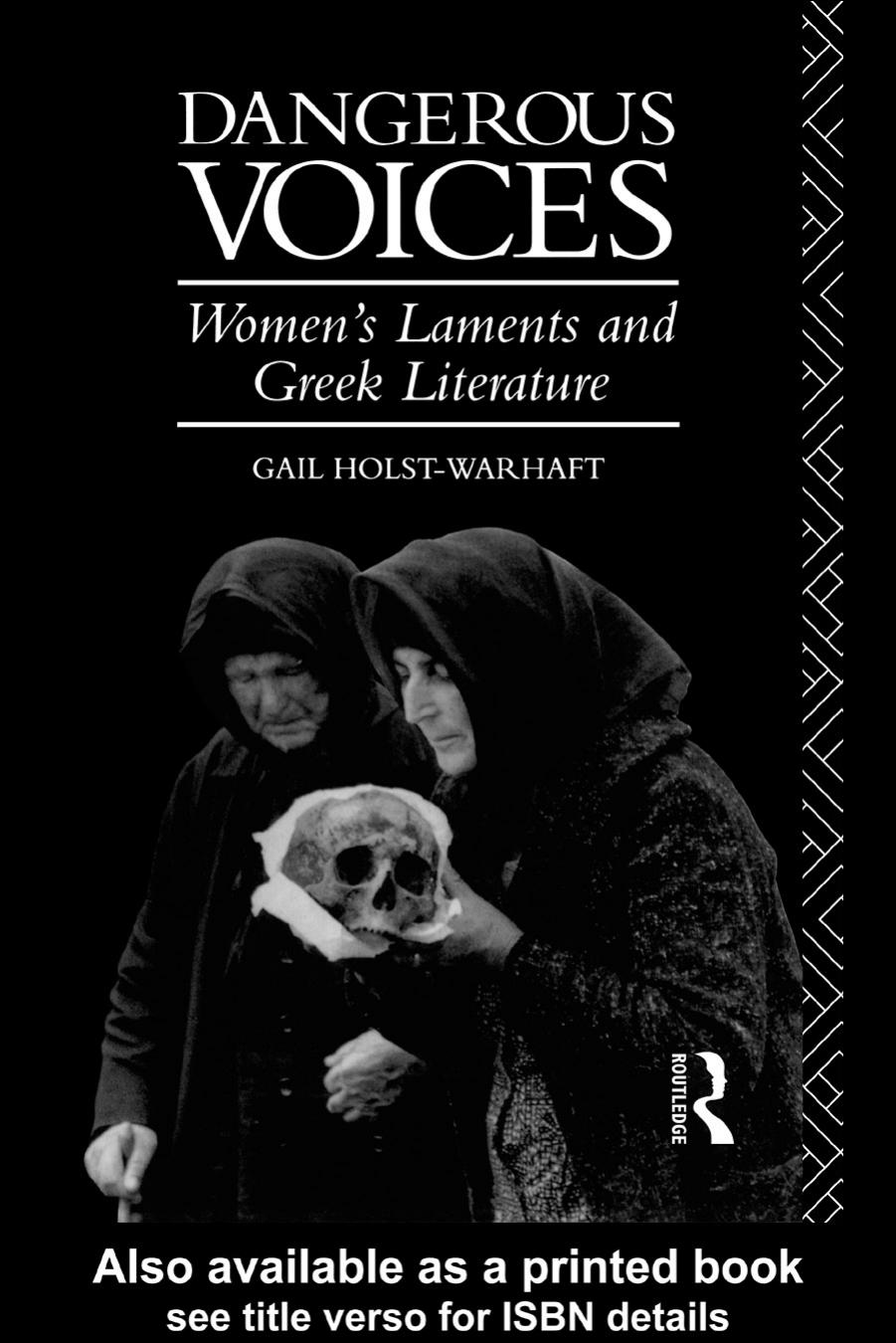Dangerous Voices: Women's Laments and Greek Literature by Gail Holst-Warhaft

Author:Gail Holst-Warhaft [GAIL HOLST-WARHAFT]
Language: eng
Format: epub, pdf
Publisher: Routledge
Published: 2011-09-30T16:00:00+00:00
AN ATHENIAN INVENTION: THE EPITAPHIOS LOGOS
The answers, I believe, are to be sought in the new forms of discourse that were developed in Athens in the fifth century. Nichole Loraux has called the Epitaphios Logos the ‘invention of Athens’.69 Demosthenes said of the Athenians: ‘They alone in the world deliver funeral orations for citizens who have died for their country.’70 In stressing the unique character of the funeral oration, as Loraux shrewdly observes, Demosthenes echoes the formula used by the authors of the epitaphioi, who proclaim the Athenians to be ‘unique among men’.71 By honouring the glorious dead, just as by praising the unique character of the funeral oration, the Athenians, are, in Loraux’s view, patting themselves discreetly on the back. Unique or not, there is indeed something new, if not totally original, about the genre of funeral oration of which Pericles’ speech for those who died in the first years of the Peloponnesian War remains the ultimate model.
The funeral oration may have its roots in a very old tradition that tried to exorcize the dead by speaking of their glorious deeds.72 But, as Loraux points out, there is almost no mention in the epitaphioi of death as a universal end to the human condition; rather, by avoiding the common verb apothanein (to die) and replacing it by the formula andres agathoi genomenoi, the speeches place the citizen soldiers that fell in combat in a realm of glory beyond the reach of death.73 Loraux observes that ‘in treating the same mythical scene, such as the aid given to Adrastus by the Athenians, the epitaphioi always adopt the bellicose version of the affair, while the tragedies feel free to choose between the military expedition and the peaceful solution. Nor is it mere chance that the authors of the epitaphioi prefer an aristocratic democracy to the democratic kings of Aeschylus and Euripides. These phenomena confirm the politico-Imilitary character of the funeral oration.’74
The political nature of the funeral oration is confirmed by the fact that it is delivered by a representative of the state. As Thucydides relates, ‘After the remains have been laid in the earth, a man chosen by the city for his reputed wisdom and his moral standing makes an appropriate speech of praise of the dead.’75 It is the city that occupies the centre of Pericles' oration. Its unique character is what men ‘nobly fought and nobly died’ for. The democratization of the army demanded a new type of loyalty to the city: the army and the city were now, in effect, one. And ‘the Athenian city, which democratized military activity, opening it to every citizen, was, perhaps more than any other polis, a “men’s club”…. War was men’s business, as were public funerals.’76 Pericles makes plain what the state expects of women in such a society. Speaking to the widows of the war dead he offers them ‘a word of advice: Your great glory is not to be inferior to what god has made you, and the greatest glory
Download
Dangerous Voices: Women's Laments and Greek Literature by Gail Holst-Warhaft.pdf
This site does not store any files on its server. We only index and link to content provided by other sites. Please contact the content providers to delete copyright contents if any and email us, we'll remove relevant links or contents immediately.
| Arts & Humanities | Health |
| Language Arts | Library Skills |
| Mathematics | Reading & Phonics |
| Science & Technology | Social Studies |
The Art of Coaching Workbook by Elena Aguilar(51198)
Trainspotting by Irvine Welsh(21663)
Twilight of the Idols With the Antichrist and Ecce Homo by Friedrich Nietzsche(18632)
Fangirl by Rainbow Rowell(9249)
Periodization Training for Sports by Tudor Bompa(8271)
Change Your Questions, Change Your Life by Marilee Adams(7780)
This Is How You Lose Her by Junot Diaz(6886)
Asking the Right Questions: A Guide to Critical Thinking by M. Neil Browne & Stuart M. Keeley(5775)
Grit by Angela Duckworth(5614)
Red Sparrow by Jason Matthews(5472)
Paper Towns by Green John(5190)
Room 212 by Kate Stewart(5119)
Ken Follett - World without end by Ken Follett(4731)
Housekeeping by Marilynne Robinson(4446)
The Sports Rules Book by Human Kinetics(4386)
Papillon (English) by Henri Charrière(4274)
Double Down (Diary of a Wimpy Kid Book 11) by Jeff Kinney(4269)
The Motorcycle Diaries by Ernesto Che Guevara(4098)
Exercise Technique Manual for Resistance Training by National Strength & Conditioning Association(4071)
